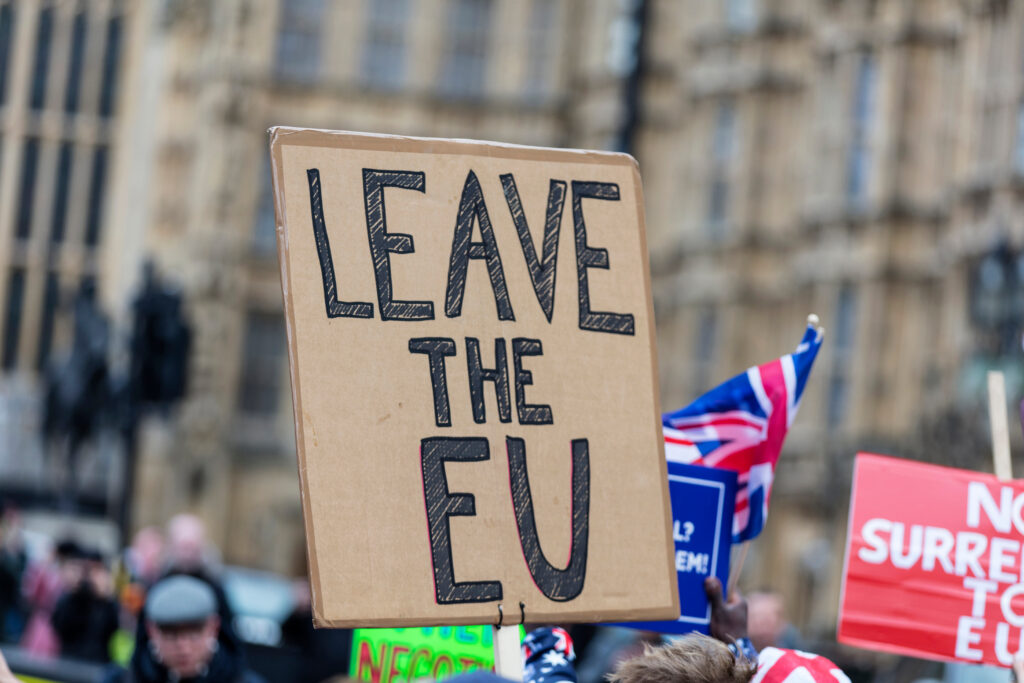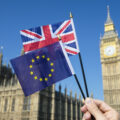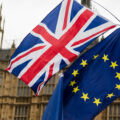Is the Brexit movement a religion? Part 3: The beliefs of Brexit
Is the Brexit movement a religion? Part 3: The beliefs of Brexit
The Leave campaign encouraged people to once again ‘believe in Britain’, a strategy that resonated with voters up and down the country. But beyond just showing confidence and support, Frazer MacDiarmid asks himself if ‘believing in Brexit’ approaches a more religious sense.
This article was written by Frazer MacDiarmid and reflects his personal analyses and opinions, rather than those of EARS.
Celebrity atheist Richard Dawkins commented in 2019 that Brexit:
“has become a religion now. It has become a faith. It has become a creed… It has become like religious zeal… It’s a form of madness.”[1]
We have already seen in the previous article in this mini-series how the Brexit movement compares to a religion as a fundamental group phenomenon. Sociologist Ronald L. Johnstone’s second characteristic of a religion is that its followers share a “body of beliefs.” I paraphrase Johnstone’s description here:
Beliefs are often based upon foundational texts, but oral traditions can supplement (and often broaden) these. Beliefs may include myths, sagas, or proverbs. These beliefs are usually not shared by those outside of the religion (and are often ridiculed by them).[2]
Belief in Britain
The language of ‘belief’ was commonplace to describe support of the Brexit project.[3] [4] ‘Believe in Britain’ was a popular rallying cry of Brexiteers.[5] [6] Then Prime Minister Theresa May, and current PM Boris Johnson, were both fans of the tag line.[7] [8] Theresa May’s statement was particularly important given that she famously voted No in the referendum, and so was asking people to believe that her conversion from Remain to Leave was genuine. To claim that someone’s belief in Brexit is false can severely threaten their career.[9] We saw last time how Brexit divides people into believers and non-believers. Believers are then separated according to their devotion (though also ideologically) into Hard-Brexiteers and Soft-Brexiteers.
To ‘believe’ in something has several meanings, such as to ‘support’, to ‘have trust in’, or to ‘acknowledge something as true or right’.[10] Recent scholarship has demonstrated how early Christian ‘faith/belief’ overlapped with Greek and Roman understandings of loyalty or allegiance in human relationships.[11] The statement ‘I believe in God’ therefore is a statement of allegiance, support, trust, acknowledgement, and personal affiliation; it is not merely an assent to an intellectual proposition (as it has widely come to be understood). To ‘believe in Brexit’ also combines a number of these meanings, from support, to personal attachment, to trust in its correctness.
Where ‘belief’ might be seen to take on a religious sense is when one trusts in something despite there being no tangible evidence for it, or despite positive evidence against it. People’s ‘belief in Brexit’ fits into this category in several ways.
Hard to believe?
The Brexit campaign relied upon several statistics or facts that have been criticised as ‘lies’ and ridiculed as ‘bogus’.[12] At the very best, pro-Brexit figures and media used misleading statistics; at worst, they deliberately tried to mislead an ill-informed and gullible electorate by appealing to their basest instincts. According to two scholars, Brexit perfectly represents an “era of post-truth politics” which relies upon the creation of “myths, fantasies and misinformation, stoking fears and false expectations amongst voters.”[13]
Take the claim that Brexit would stop the UK from paying £350 million per week to the EU, which it would spend on the country’s National Health Service (NHS). This claim was first made in an article in the Telegraph by Boris Johnson, then Foreign Secretary.[14] Even at the time it was criticised as wildly inaccurate and misleading, with several prominent Brexiteers admitting that the figure was incorrect.[15] Johnson even faced legal action over the false claim.[16] When rebates and EU funding of the UK is taken into account, the figure is around half Johnson’s claim.[17] [18]It also ignores the NHS’s reliance upon Europe for professionals: nearly 30% of doctors working in English NHS facilities were non-British nationals in June 2019.[19] However, these refutations were largely ignored by Brexiteers, who preferred to have faith in their leaders regardless.
Brexit bus bogus
Nevertheless, it was still taken up by the Brexit campaign and put on the side of an enormous ‘Brexit Bus’, which read: “We send the EU £350m a week: let’s fund our NHS instead.” This might be considered a ‘foundational text’ of the Brexit religion. The stunt of the Brexit bus was clearly aimed at appealing to working-class Brits, and became a symbol of Brexit as a populist movement. It was no longer a fact or claim, but a belief. Repeated over and over again by Brexiteers, appearing on social media, billboards, and fliers across the country, millions of people believed that Brexit would pump £350 million into the NHS, despite abundant evidence that this was not true.[20] In our increasingly ‘post-truth’ cultural and political landscape, it is becoming more acceptable to believe in something not on the basis of evidence, but on the basis of how we feel, or our own personal impressions of an issue.[21]
The claim that the NHS will get £350 million extra each week was essential to Vote Leave’s victory, as one of the architects of the Brexit campaign, Dominic Cummings, freely admitted.[22] Its success was largely down to the ‘Holy Grail’ status held by the NHS in the British public consciousness. Famously referred to by a prominent politician as “the closest thing the English people have to a religion,”[23] the NHS enjoys wild popularity among the British public, makes them feel proud to be British, and contributes strongly towards British identity.[24]
The mythology of Brexit
Sociologists Steven Kettell and Peter Kerr outline three ‘myths of Brexit’:
1. The special status of the British people
2. The EU as a threat
3. The irrefutable ‘will of the people’
Both explicitly and subtly, the Leave campaign sought to make the British people believe these myths, and therefore vote for Brexit. None of these myths was created from scratch: they strongly draw upon pre-existing strains of British nationalism and exceptionalism. Nor do they deal with factual claims that can be disproven with evidence. They are beliefs, appealing to deeply held convictions about a unique and precious British identity that is being undermined by an external ‘European’ enemy. I will discuss the idea of the British people as ‘sacred’ in the final article in this series.
We have focussed on one main ‘belief’ or ‘myth’ of the Brexit campaign – that of the Brexit bus and its £350m NHS claim. There are many other articles of faith, some associated with the myths and beliefs discussed above, that were essential for driving the Leave campaign. Just a couple of these are: ‘Foreign citizens are taking all our benefits, costing the government millions’,[25] Brexit will create ‘more jobs’,[26] and immigration is making Britain ‘too diverse’.[27]
The Brexit campaign’s success relied upon many unfounded and refuted ‘beliefs’ and fundamental myths, some of which we have seen above. Research has also shown a marked affinity between the motivations driving Leave voters and religious believers. However, our ‘fake news’, photoshopped, ‘post-truth’ environment is exposing how difficult it is to lead a life based only on ‘facts’ or ‘science’, and not to a large degree on beliefs. In any case, as we have seen, Brexit in several key ways conforms to Johnstone’s second characteristic of religion.
This article was written by Frazer MacDiarmid and reflects his personal analyses and opinions, rather than those of EARS.
Our team of analysts conducts daily research on religion and society. In the past month, the topics of tension, leadership, and image were trending. Find out their relationships on the EARS Dashboard.
[1] Richard Dawkins: ‘Brexit is now a religion. They don’t mind if they destroy the country’
[2] Ronald L. Johnstone, Religion in Society: A Sociology of Religion (Routledge, 2015), pp. 8-14
[3] I voted Remain – but now it’s time to believe in Brexit
[4] I believe in Brexit – and no I’m not racist, stupid or politically extreme. But I fear it’s not going to happen
[5] Brexit backers block Westminster roads chanting ‘Bye-bye, EU’
[6] SUN SAYS We urge our readers to beLEAVE in Britain and vote to quit the EU on June 23
[7] Theresa May: ‘I believe in Brexit’
[8] Believe in Britain: The Simple Message that Won Brexit Still Works Wonders for Boris Johnson
[9] David Cameron: Boris Johnson ‘didn’t believe’ in Brexit
[11] Teresa Morgan, Roman Faith and Christian Faith (Oxford: Oxford University Press, 2015).
[12] Boris Johnson’s £350m claim is devious and bogus. Here’s why
[13] Kettell, S., & Kerr, P., ‘The Brexit Religion and the Holy Grail of the NHS’ Social Policy and Society 20:2 (2021), 282-295.
[14] Boris Johnson: My vision for a bold, thriving Britain enabled by Brexit
[15] Boris Johnson’s £350m claim is devious and bogus. Here’s why
[16] Brexit: Boris Johnson faces Supreme Court bid to make him stand trial over campaign ‘lies’
[17] Boris Johnson’s £350m claim is devious and bogus. Here’s why
[18] Kettell, S., & Kerr, P., ‘The Brexit Religion and the Holy Grail of the NHS’ Social Policy and Society 20:2 (2021), 289.
[19] Kettell, S., & Kerr, P., ‘The Brexit Religion and the Holy Grail of the NHS’ Social Policy and Society 20:2 (2021), 289.
[20] Kettell, S., & Kerr, P., ‘The Brexit Religion and the Holy Grail of the NHS’ Social Policy and Society 20:2 (2021), 290.
[21] Hopkin, J. and Rosamond, B., ‘Post-Truth politics, bullshit and bad ideas: “deficit fetishism” in the UK’, New Political Economy 23:6 (2018), 641-55.
[22] Dominic Cummings: how the Brexit referendum was won
[23] The NHS is the closest thing we have to a religion – and that’s why it must be privatised
[24] Kettell, S., & Kerr, P., ‘The Brexit Religion and the Holy Grail of the NHS’ Social Policy and Society 20:2 (2021), 290-291.






